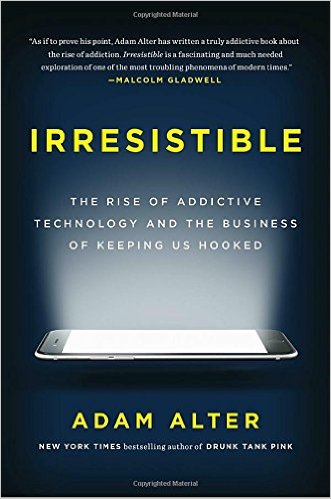There is no doubt that kids now grow up in a completely different environment than people did just a couple of decades ago. So much so that screen taps become the first act of exploration and come much before holding a pen. Screens are ubiquitous and it won’t be a surprise if our physical features adapt to these new methods of communication in years to come. But the medium itself is not the problem. The problem is in the design of these interfaces that make interaction with devices addictive. Adam Alter is not again use of technology. On the contrary, he exhorts the readers to understand how these interfaces work and use them for their benefit. In Irresistible: The Rise of Addictive Technology and the Business of Keeping Us Hooked, Adam Alter shows you how you can use the ‘ills’ of addictive technology to your benefit and steer away from the bad influences.
Adam Alter is an Associate Professor of Marketing and Psychology at New York University’s Stern School of Business, and the author of Drunk Tank Pink, a New York Times bestseller about the forces that shape how we think, feel, and behave. Alter was recently included in the Poets and Quants “40 Most Outstanding Business School Professors under 40 in the World,” and has written for the New York Times, New Yorker, Wired, Washington Post, and The Atlantic, among other publications.
Irresistible: The Rise of Addictive Technology and the Business of Keeping Us Hooked
Author: Adam Alter
Hardcover: 368 pages
Publisher: Penguin Press (March 7, 2017)
ISBN: 1594206643, 978-1594206641
Irresistible Book Review
Are you glued to your phone screen, your tablet, or any other screen and cannot spend even five minutes away from these devices? You might be an addict. Average human attention span has shrunk from 12 seconds to below 7 and we are now officially more vulnerable than a Gold Fish when it come to sticking to a thought or activity.
The author begins with a discussion of what addiction is like and how exposure to electronic devices is much more addictive than drugs and alcohol. He attributes this danger mainly to easy and cheap access. Moreover, it is unlikely that people will shun you for fidgeting with some device, like they would shun a drunk or drugged person.
“We are all one product or experience away from developing our own addictions.”
He goes into how products like addictive video games, Facebook, and Instagram are designed to keep people glued to the screen. Social reinforcement was limited to a few events earlier. You wear new clothes to a party, get good grades, win a race . . . These were the events that got social response and gave the participant a ‘high’ similar to what a drug abuser would get. With Facebook and other apps, this ‘High’ is available on demand. People post photos of their daily activities and are rewarded with likes and comments, which further reinforces the behavior. Imagine Facebook and Instagram without a Like button. How many would keep posting these photos if there was no way of giving a feedback and even if they knew there were hundreds watching their photos?
But it is not just these apps. Some of us spend time on checking email or browsing the Internet for News or for other similar reasons. Many of us now spend anywhere between one to four hours a day staring at our phone screens, making this the second longest activity after sleeping, says the author.
The situation is truly alarming. But you can resist the charms of technology. In the second part of the book, the author discusses how designers of games and apps make their products addictive. Winning, social reinforcement, and thrills are some of the feelings that keep us going back to these products and screens, whether it is Gaming or binge watching.
In the last part of the book, the author shows you how you can stay away and use these technologies in moderation. How you can use the for your benefit and do not allow them to drive you and your behavior. Why is it bad to spend so much time on these screens? because it keeps you from doing productive work or spend time with people in real world. He warns that if we do not keep kids away from these screens, there will perhaps come a time when the new generation will fail to recognize non-verbal cues and body language that communicates so much about people around you and their state of mind.
Additional Reviews and Views About Irresistible Book
Interview With Adam Alter
“Alter makes a convincing case that we should all be worried about the addictive potential of today’s technologies – and yet I was not convinced.” ~ Joshua Kim, Inside Higher Ed
